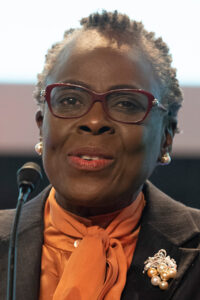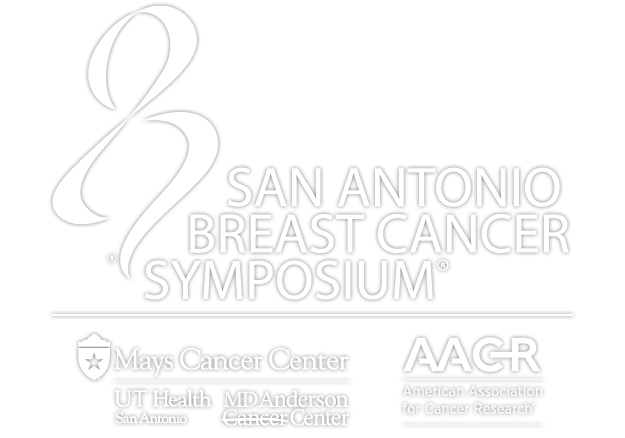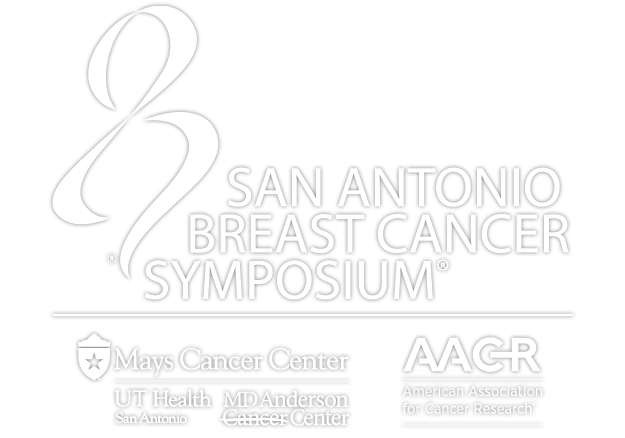
Breast cancer is not an equal opportunity disease. It can strike anyone, but women of African ancestry are at higher risk wherever they live.
“Women of African ancestry tend to have more ER- cancer, be younger, and have higher rates of recurrence,” said Olufunmilayo I. Olopade, MD, FAACR, Walter L. Palmer Distinguished Service Professor at the Center for Clinical Cancer Genetics & Global Health, The University of Chicago. “In looking at cancer, I started thinking more about genetics than about signaling. We were thinking about germline genetics, that it was possible to preempt cancer and prevent cancer.”
Dr. Olopade recounted her lifelong journey through breast cancer genomics during the William L. McGuire Memorial Lecture Heterogeneity of Breast Cancer Genomes: Going Beyond Therapy to Risk Assessment and Prevention on Wednesday. Her presentation will be available to registered SABCS attendees through March 10, 2022.
One of the key problems in preventing cancer is the lack of appropriate risk assessment tools, Dr. Olopade said. For 20 years, it has been recognized that women carrying a BRCA1 mutation are at higher risk for more aggressive ER- breast cancer and that BRCA1 mutations are more common in Black women. Transforming that knowledge into practical cancer prevention, however, is a work in progress.
Women of African ancestry have higher rates of young onset and more aggressive breast cancer globally, not just in the US, she continued. There are significantly higher rates of pathogenic variants of breast cancer predisposition genes in women across the African diaspora globally, she continued. Women of African ancestry have higher rates of BRCA1 mutation, higher rates of ER- tumors, and are more likely to be diagnosed with breast cancer at age 50 and younger.
Whole genome sequencing of breast cancer patients and matched controls in Nigeria uncovered multiple aberrations and greater genomic instability in tumor patients. Their tumors have increased prevalence of TP53 and GATA3 mutations, early drivers of breast cancer, as well as fewer PIK3CA and CDH1 mutations. These tumors show increased activity of homologous recombination deficiency (HRD) mutational signatures.
Genomic signatures can identify tumors with HRD and can be used to infer the woman’s BRCA type, Dr. Olopade noted. A third of Nigerian women, 34%, have HRD, suggesting an opportunity to create biomarkers and associated therapies.
“We need to build better models for risk assessment,” she said. “If you have a risk of ER- breast cancer, what are you going to do about it?”
Wisdom, a risk-based mammography study, is recruiting 70,000 women across the US to help find out. The study compares risk-based mammography against annual randomized screening and self-selected screening.
Semi-annual MRI screening of BRCA1 mutation carriers can also help.
“If you have a dense breast, we can pick up your cancer at 6 mm on MRI,” she continued. “And we can start screening at age 40.”
The good news, Dr. Olopade added, is that ER- tumors are highly responsive to platinum.
“Chemotherapy works, but sometimes, by the time we give platinum, it is too late.”
The goal is to improve treatment outcomes for all patients, she continued. Outcomes between Asian, Black, and white women with pathologic complete response is similar. But among non-pCR patients, Black and Asian women are more likely to die than white patients.
“We must develop precision approaches that work in all populations, because we are all one human race,” Dr. Olopade said. “We need to broaden global access in all communities, not just in communities with a lot of rich white women.”



